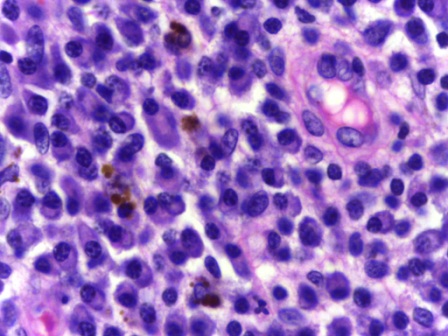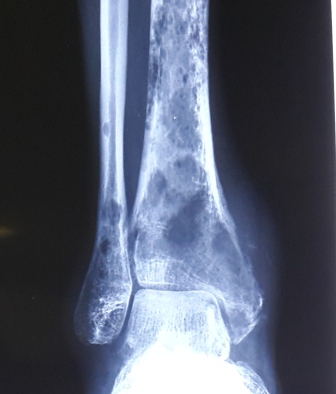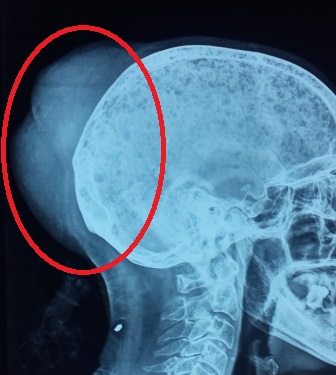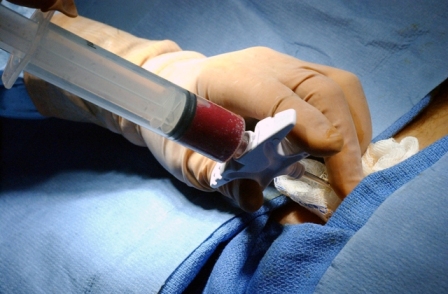Multiple Myeloma treatment in Delhi India – Multiple Myeloma Specialist in Delhi
Multiple myeloma specialist in Delhi | Access multiple myeloma treatment in Delhi NCR, Faridabad, Gurgaon, Noida from AIIMS Gold Medalist cancer expert. Formerly at AIIMS for more than 12 years, with numerous national and international awards and research. More information here.
What is multiple myeloma?

Multiple myeloma is a cancer of plasma cells
Multiple myeloma (MM) is a type of cancer which arises from plasma cells. Plasma cells are a type of cell normally present in the bone marrow and blood in small numbers. Their function is to produce antibodies that fight against infections. When these cells start dividing uncontrollably and spread abnormally in the body, it leads to the disease called multiple myeloma.
More general information on cancer
Is multiple myeloma a bone cancer/kidney cancer?
No, multiple myeloma is a blood cancer and arises from cells normally present in the bone marrow and blood. These cells divide and produce substances that damage the bones and kidneys.
Learn about actual bone cancers (sarcomas)
Learn about another type of blood cancer (lymphomas)
What age group is multiple myeloma commonly seen in?
Multiple myeloma is a disease of the elderly age group. Generally it is only seen above the age of 50 years.
What are some common symptoms of multiple myeloma? What is meant by “CRAB” and “ROTI”?
Multiple myeloma commonly damages four major organs, leading to its key features, which are remembered by the word “CRAB”. These features are also called “ROTI” which means “myeloma–Related Organ or Tissue Impairment“. These are:
HyperCalcemia: which can lead to drowsiness, confusion, inappropriate behaviour, coma, heart rhythm disturbances, abdominal pain etc
Renal (kidney) abnormalities: Which can lead to decreased urine output, excess fluid in body, electrolyte disturbances and even unconsciousness
Anemia: Meaning decreased red blood cell production, usually leading to weakness, fatigue and breathlessness
Bone lesions: Leading to pain in the body, fractures and sometimes even damage to the nerves or spinal cord due to fractures in the spine
Is renal failure due to multiple myeloma reversible?
Kidney damage caused by myeloma is often reversible with prompt initiation of therapy. However, the reversal may not be complete and in some cases may also fail to occur at all. Usually, the longer the duration of kidney damage, the more difficult it is to fully reverse.
Are bone lesions due to myeloma reversible?

Bone lesions are among the most common features of myeloma
Multiple myeloma leads to punched out lesions of the bone as seen in the photo above. These weaken the bone and lead to pain and risk of fractures. These lesions are partially reversible and bone strength gradually improves over time with proper treatment.
What is a plasmacytoma?

Plasmacytomas are sometimes seen in myeloma
Plasmacytomas are collections of malignant plasma cells outside the bone marrow/blood. These usually occur in the form of masses which may or may not be visible externally. These are occasionally seen in some patients. Plasmacytomas usually disappear with appropriate treatment.
What is meant by “M-band”?
Myeloma cells usually produce specific antibodies which can be detected in the blood or urine. This is called an “M-spike”/monoclonal spike. This test is also called “serum/urine protein electrophoresis” (SPEP/UPEP). The detection of M-spikes allows an easy way to diagnose and monitor patients, as the M-spike generally increases and decreases alongwith the level of disease in the body.
Get help in interpreting your M-band report – send us a free E-consultation
What tests are required in a patient with multiple myeloma?
In general, the following tests are needed:
- A number of blood tests
- Urine tests
- Bone marrow aspiration and biopsy
- Molecular tests (cytogenetics/FISH/PCR), which are usually done on the bone marrow sample
- A skeletal survey (X rays of the entire body), and/or a PET-CT scan
- Sometimes, biopsy may be needed from a suspected plasmacytoma
- Additional tests may be needed on a case-by-case basis
What is bone marrow aspiration and biopsy? Is it painful? Can it be avoided?

Bone Marrow biopsy is a common and safe procedure
Bone marrow aspiration/biopsy is a small procedure carried out under local anaesthesia. In it, a small needle is inserted into the pelvic bone and bone marrow is taken out for testing. The entire procedure usually does not take more than 15-30 minutes, and is generally done on outpatient basis.
In expert hands, bone marrow biopsy produces only minimal pain which recovers very soon.
Generally, bone marrow biopsy is a mandatory part of multiple myeloma evaluation and must be done at least once for all patients.
For more information about a safe bone marrow biopsy: Send us an E-consultation
View a video on bone marrow biopsy online
What is “MGUS” and “Smouldering Multiple Myeloma”?
MGUS, which stands for monoclonal gammopathy of undetermined significance, is a condition related to multiple myeloma. In MGUS, a M-spike is found in blood or urine but the condition is unlikely to progress to myeloma in the vast majority of patients. Unlike myeloma, MGUS is common and usually requires no treatment.
Smouldering multiple myeloma (SMM) in general means a disease which is more advanced than MGUS but does not yet show features of multiple myeloma (typically indicated by CRAB – see above). SMM patients are often not treated but need to be watched very closely because a significant percentage of them will evolve into full-blown multiple myeloma.
Expert opinion on MGUS and SMM
What are the stages of multiple myeloma? What is “ISS” and “R-ISS”?
There are many different staging systems for multiple myeloma. The most commonly used is the ISS (International staging system) and the R-ISS (Revised ISS). Both these systems have three stages (I, II and III) which defines the approximate prognosis of the disease. Another staging system which was used commonly in the previous era was DSS (Durie-Salmon System), however this is not commonly used nowadays.
How is multiple myeloma treated?
Multiple myeloma is a chronic disease.The treatment of multiple myeloma is done over many years to control the disease at the lowest level possible. Expert multiple myeloma treatment in Delhi, India is available.
In general, the treatment of multiple myeloma includes:
- Antimyeloma drugs: These are discussed in more detail below. These include proteasome inhibitors (PIs), immunomodulatory imide drugs (IMiDs), steroids, monoclonal antibodies, chemotherapy, and some other options. Various combinations of these drugs are used over many years to control the disease as long as possible.
- Bone Marrow/stem cell transplantation: This is used to induce a long-lasting remission in multiple myeloma. This is discussed in more detail below.
- Other supportive care: Patients with myeloma often require complex supportive care, including bone-protecting agents, treatment of kidney failure, support for weakened bones, therapy of hypercalcemia, radiotherapy for painful lesions/plasmacytomas etc.
THE IDEAL TREATMENT OF MULTIPLE MYELOMA IS HIGHLY COMPLEX AND RAPIDLY CHANGING. ONLY AN EXPERT ONCOLOGIST SHOULD TREAT MULTIPLE MYELOMA
E-consultation with a multiple myeloma specialist in Delhi
What are proteasome inhibitors (PIs) and Immunomodulatory imide drugs (IMiDs)?
Proteasome inhibitors are a common class of drugs used to treat multiple myeloma. These drugs include bortezomib, carfilzomib and ixazomib. These drugs work by blocking the functioning of proteasomes, which are protein breakdown factories inside cells.
IMiDs are drugs that modulate multiple targets within and around cancer cells which leads to their death. These include thalidomide, lenalidomide and pomalidomide.
Both PIs and IMiDs are among the most active and most commonly used drugs in myeloma and are commonly used as first-line drugs. These drugs fall into the class of targeted therapies.
Learn more about targeted therapies and how they work
Does immunotherapy work in multiple myeloma? Is multiple myeloma immunotherapy available in Delhi for treatment of multiple myeloma?
Multiple myeloma immunotherapy works by stimulating the body’s own immune system to kill cancer cells. This class of drugs in myeloma is also called monoclonal antibodies. These are drugs that are targeted against specific signals present on myeloma cells and have been noted to produce remarkable responses even in patients with difficult to treat, resistant disease. While currently they are used mostly for resistant disease, the use of these drugs is expanding and will possibly move to the frontline in the near future. These drugs are now available in Delhi, India for myeloma treatment.
Learn more about cancer immunotherapy
What are zoledronic acid and denosumab? Why are they given?
Zoledronic acid and denosumab are “bone-protecting agents” which reduce the risk of fracture in myeloma patients. They are usually given alongside antimyeloma therapy.
What is bone marrow transplantation/stem cell transplantation? Is it compulsory in all patients?
Bone marrow transplantation (BMT) is a procedure that involves:
- Eliminating the patient’s own hematopoietic (blood producing) and immune (infection fighting) system
- Replacing it with the patient’s own (autologous) or foreign (allogenic) system
In multiple myeloma, the main purpose of BMT is to extend the duration of remission. While BMT has its risks, it can often dramatically increase the depth and duration of disease control. However, BMT is not advisable or possible routinely in every patient. Only relatively fit patients can tolerate BMT.
Free E-consultation regarding the appropriateness of BMT from a myeloma specialist in Delhi
What is the prognosis (outcome) in multiple myeloma?
In general, myeloma is a chronic, slow disease which is controlled for many years. The exact prognosis depends on a large number of factors, including patient characteristics, disease aggressiveness, biomarkers, and response to treatment. High quality treatment of multiple myeloma in Delhi, India can dramatically improve the survival of patients. Most patients will live healthy, productive lives for many, many years and in some cases, even decades.
THE QUALITY OF TREATMENT HAS A MAJOR INFLUENCE ON THE PROGNOSIS OF MULTIPLE MYELOMA. MULTIPLE MYELOMA SHOULD ONLY BE TREATED BY AN EXPERT ONCOLOGIST
What is the cost of multiple myeloma treatment in Delhi, India?
Myeloma is a complex disease and can be treated in many ways. An expert and ethical medical oncologist can ensure the best treatment at most affordable cost. For example, inappopriate treatment of a patient with MGUS may cost lakhs of rupees, while observation alone usually costs nothing. As another example, use of costly monoclonal antibodies may cost many lakhs per month while other therapies may produce good outcomes at even a fraction of the cost. Thus, consulting an expert medical oncologist is strongly recommended to obtain the best treatment of multiple myeloma in Delhi, India at an affordable price.
Why is it important to consult a multiple myeloma specialist in Delhi NCR?
Delhi is one of the best cities in India for the treatment of multiple myeloma. However, the treatment of multiple myeloma requires significant expertise due to the complexity of treatment and disease aggressiveness. Sometimes, no treatment or minimal treatment may be appropriate. At other times, one needs to be very aggressiveand utilize all tools at our disposal for active treatment. Improper frontline treatment can sometimes lead to a resistant, incurable disease. Recently, there has also been a massive influx of new drugs, genetic tests and personalized therapy. An expert is needed to navigate this complexity.
Dr Vineet Govinda Gupta is a medical oncologist based in Delhi NCR with expertise in the treatment of multiple myeloma. He has received AIIMS Gold Medal for best medical oncologist and has been there for more than 12 years.He has received numerous awards and published research in cutting-edge journals. He also has significant experience in bone marrow/stem cell transplantation. More information here
View my detailed curriculum vitae
I want more information on the treatment options in multiple myeloma
You can access more information using various sections of this website. Some common topics of interest are linked below. For other topics you can use the menu above or the search box. If you cannot find your topic of interest, you can send me a free E-consultation using the form below.
- General Information about cancer
- Information about bone cancers (not myeloma)
- Other blood cancers (CML, Lymphoma)
- Information about chemotherapy
- Information about targeted therapy
- Information about immunotherapy
Free E-consultation with an expert multiple myeloma specialist in Delhi
If you have additional questions about myeloma treatment in Delhi not answered by the above section, use the form below to send me your queries and we will get back to you shortly. You can also Email me at vineetgovindagupta@gmail.com or call/whatsapp me on +919013812875.
